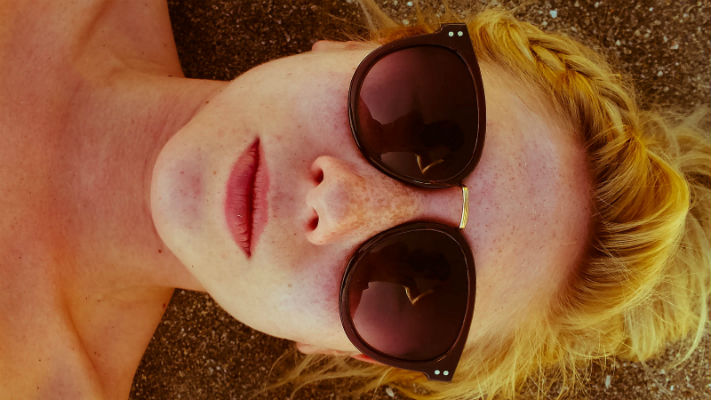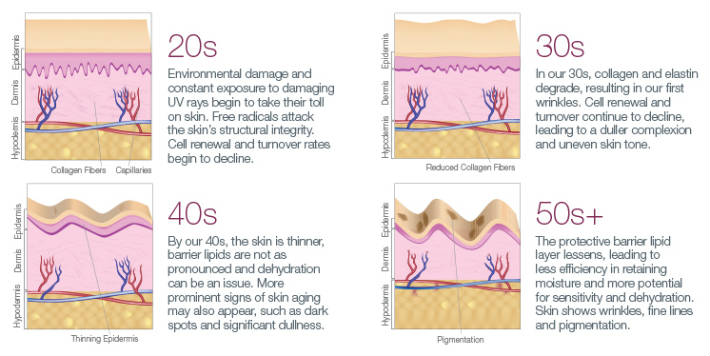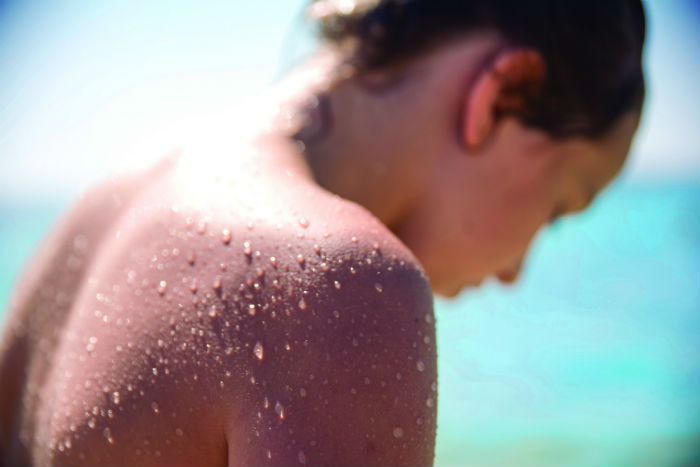When is the best time to start using anti-aging products? In your teens? Your 20s or 30s? And for that matter, what products should you use to combat signs of aging?
It’s best to start young. If you’re in your early 20s, being proactive about taking care of your skin means not only using the right skin care products but also knowing the essential anti-aging ingredients. By adopting an anti-aging routine early, you’re taking preventive steps to maintain your youthful looks in the long run. For latecomers when it comes to anti-aging skin care, there’s still time to minimize and even undo the damage.

Photo: © Daniel Lamb – Sun Kissed, Creative Commons
The Effects of Aging on Skin
The skin is the largest organ of the body and skin aging occurs naturally as a person grows older. Aside from typical signs of aging like hair turning gray or white, wrinkles may develop and skin will start to sag as it loses elasticity. These visible changes to skin may occur:
1. Thinner Epidermis, More Pigment Spots
According to this article on Medline Plus issued by the US National Library of Medicine, the effects of aging include thinning of the epidermis, which is the outer layer of the skin, and decrease in number of melanocytes (skin cells containing pigment that affects skin color). This leads to skin looking thinner, paler and more translucent, while pigment spots like liver spots and age spots may appear on areas exposed to the sun.
2. Loss of Elasticity
Skin loses elasticity as we age, especially under extensive sun exposure. The strength and elasticity of the skin’s connective tissues decrease, resulting in a darker complexion as well as a leathery, weather-beaten look. The skin’s fat layers also become thinner, meaning there is less insulation and padding.

Skin aging diagram from Dermalogica.com.au
3. Skin Looks More Dry
Sebum, which is the bane of oily or acne-prone skin types, is actually the skin’s natural lubricant. Lack of moisture in skin causes the sebaceous glands to compensate for this difference, making them over-produce oils to prevent skin from drying out. The skin produces less sebum as one grows older, resulting in dry skin and thus a higher chance of developing fine lines and wrinkles. This is why many anti-aging products are geared towards restoring hydration.
Factors That Cause Premature Aging of Facial Skin
Aside from genetics and nutrition, there are many causes of skin aging:
1. Lifestyle
Smoking, excessive alcohol, lack of sleep and stress are among the most common reasons behind premature skin aging. Unhealthy lifestyle habits such as smoking and drinking not only affect skin health but also the body’s overall condition. Not getting enough sleep also leads to dull skin tone and dark eye circles, among others.
2. Dehydration
Yet another reason why you should drink eight glasses of water a day. While the amount of water one must drink varies individually, the bottom line is that the body — and your skin — needs water. As the human body is mostly made of 60% water, lack of it leads to dry, sagging skin as well as other health problems. Drinking enough water also ensures that your skin maintains an ideal moisture-and-sebum ratio, which prevents excessive oil buildup and hence the formation of acne, blackheads and other blemishes.
3. Pollution
Aside from internal factors, the skin is also affected by external elements such as pollution. In 2016, the World Health Organization reported that 80% of people living in urban areas were affected by excessive air pollution. Polluted air carries dust, carbon exhaust and other harmful substances that may severely affect one’s overall health. Skin exposed to excessive pollution can also suffer from cellular damage and stress caused by free radicals, leading to further loss of elasticity and clarity.
4. Sun Damage
Over the years, experts have proven that sun exposure is the number one cause of skin aging. According to this study on ultraviolet radiation and aging published in the National Center for Biotechnology Information (NCBI), UV radiation not only causes external changes to skin such as darkening, dryness, fine lines and wrinkles, but it can also cause inflammation, immune changes, impaired wound healing, and even DNA damage that leads to skin cancer.

Photo: © Skeyndor, Creative Commons
The Importance of Using Anti-Aging Skin Care
“An ounce of prevention is worth a pound of cure,” according to Benjamin Franklin. Keep this nugget of wisdom in mind if you want to embark on a preventive anti-aging skin care regimen, especially if you’re in your early 20s. If you’re in your 30s or 40s, using the right skin care products with proven anti-aging ingredients may help prevent further damage.
1. Use Actives like BHA and AHA
As mentioned previously, aging makes skin more prone to pigmentation. Using acids like alpha hydroxy acids (AHAs) and beta hydroxy acids (BHAs) can help. AHAs work on the surface of skin to reduce fine lines, brighten skin tone and fade pigment marks. Glycolic acid, lactic acid and mandelic acid are among the most common forms of AHAs. BHAs work under the skin and are ideal for dealing with inflammation such as acne. Using a BHA- or AHA-based exfoliant in your skin care regimen helps remove the build-up of dead and rough skin that makes your complexion look dry, dull and even wrinkled. By Wishtrend’s Mandelic Acid 5% Skin Prep Water contains 5% mandelic acid which is gentle enough for regular use.
2. The Power of Retinol and Antioxidants
Retinol is one of the most commonly used ingredients in anti-aging skin care. It is a form of Vitamin A that targets fine lines and wrinkles, roughness, pigmentation and acne, and also restores firmness. This Lab Muffin post by science educator Michelle Wong, who holds a PhD in Chemistry, explains how retinol works on skin by increasing the amount of collagen. The body slows down collagen production as we age, and other factors such as UV exposure and unhealthy lifestyle habits may contribute to the loss of collagen. Retinol also helps quicken cell turnover, resulting in younger-looking skin. The Missha Time Revolution Night Repair Borabit Ampoule is a cult favorite because of its effective combination of retinol with fermented and brightening ingredients that help refine skin over time.
Antioxidants are another essential super ingredient in anti-aging creams, serums and toners. Green tea is one of the best known sources of antioxidants, and is also known for its anti-microbial, anti-inflammatory and astringent properties. Other sources of antioxidants include retinol, Vitamin C, Vitamin E and soy extract. Antioxidants work by neutralizing free radicals, especially those caused by environmental stress such as pollution. The Dear Klairs Fresh Juiced Vitamin Drop contains a low amount of Vitamin C that’s just right for sensitive skin or those trying a Vitamin C treatment for the first time. The Dear Klairs Midnight Blue Youth Activating Drop comes in an actual blue color due to the guaiazulene extracted from chamomile, and contains Epidermal Growth Factor (EGF) and peptides to promote cell renewal and restore firmness.
3. Maintain Hydration
Wrinkles, dryness and sagging are among the most common signs of facial aging. All these result from loss of elasticity and lack of moisture. Ceramides are an ingredient commonly found in moisturizing creams. According to Michelle of LabMuffin and this article over at Paula’s Choice, ceramide serves as the “mortar” that holds the cellular “bricks” together. This helps skin retain water and keep out irritants. Michelle’s post further explains that just like collagen, the body also loses ceramide as we age, which results in skin dryness and sensitivity.
Hyaluronic acid is a well-known humectant, meaning it helps bind moisture to skin, resulting in hydrated, softer skin. Whether it’s hyaluronic acid or its salt form known as sodium hyaluronate, having one or both in your toner, lotion and anti-aging cream gives your skin plenty of moisture power. Hyaluronic acid is one of the star ingredients in the Beauty of Joseon’s Dynasty Cream, along with Panax ginseng and nourishing oils like olive, sunflower seed, sea buckthorn and argan oils.
4. Don’t Forget the Sunscreen
It’s worth repeating that the number one cause of skin aging is UV exposure. Using sun protection is the best way to minimize sun damage, and hands-down the best way to avoid premature skin aging. Some anti-aging ingredients such as retinol and Vitamin C are photosensitive, meaning the active ingredients break down and lose their effectiveness when exposed to the sun, so religious application of sunscreen is very important. This report published on NCBI shows that based on clinical tests conducted among elderly Japanese, sunscreen can reverse the damaging effects of photoaging even on aged skin. Regular use of sunscreen every day — such as the bestselling Kao Biore UV Aqua Rich Water Essence SPF 50+ PA++++ (2017 Edition) — and reapplication throughout the day, is the real secret to looking young!
ALSO READ Negative Thoughts Harm Your Health By Damaging DNA
READ MORE Celebs Give Inside Scoop On How They Avoid Facial Fine Lines

